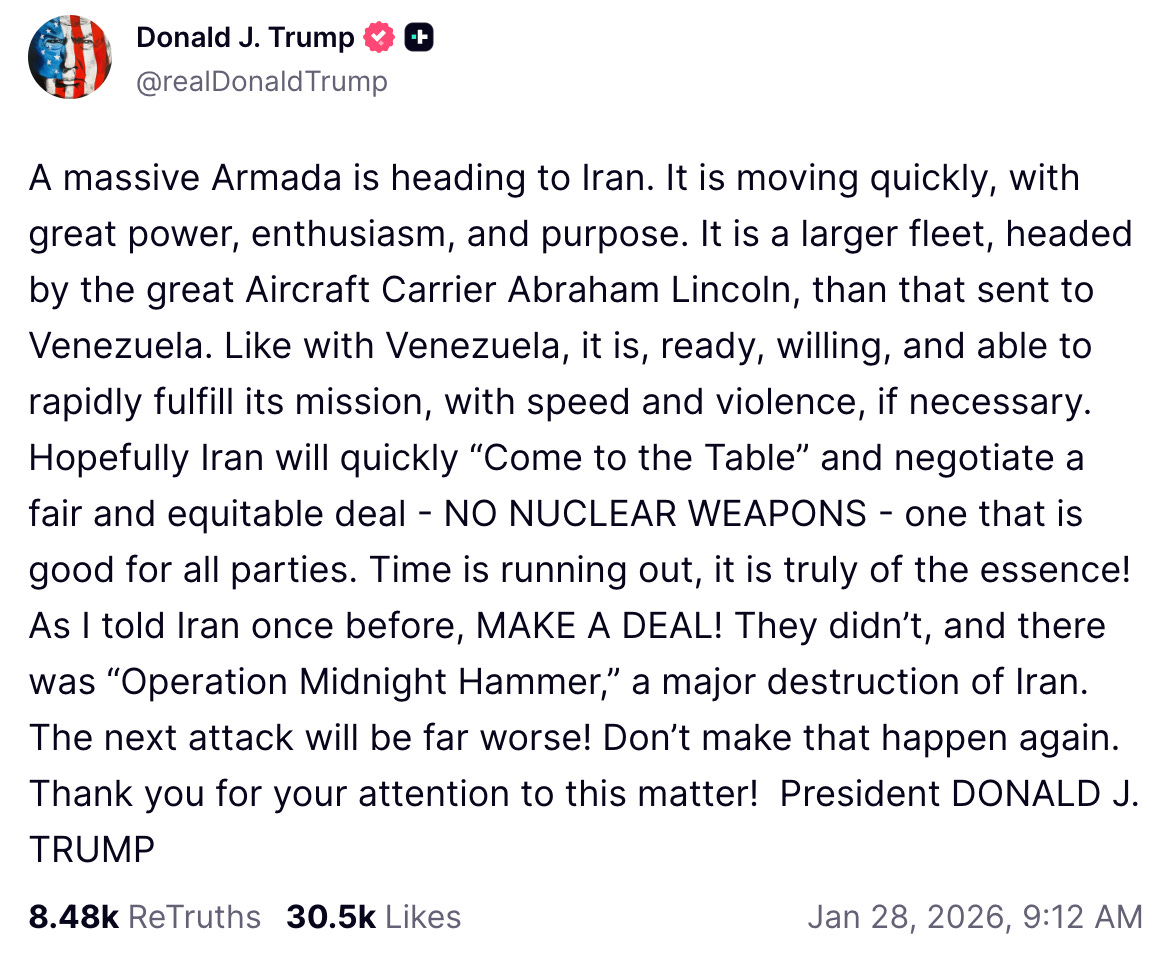As the war in Ukraine grinds on into its second year with Republican House Speaker Kevin McCarthy now pledging his full-scale support for President Biden's proxy war and new leaked documents warning the war will likely be fought through 2023 and beyond, we want to pull back the lens a bit on this war and examine an often overlooked component of U.S. involvement, namely, what is the impact on the lives of American citizens from what appears to be an endless commitment of their resources, their money, to fuel this proxy war, $100 billion and counting. We've often covered the geopolitical questions of the war as well as the dangers it poses. Little things like the warning from President Biden himself that his war policies have brought the world closer to nuclear Armageddon than at any time since the Cuban Missile Crisis of 1962. But here, supporters of the U.S. role in Ukraine tell it Americans pay no price at all for this massive flow of money from the U.S. Treasury into the coffers of U.S. weapons manufacturers, the intelligence community, and into the foggy precincts of Ukraine, which just so happens to be by far the most corrupt country in Europe.
Can America's commitment to militarism and endless war abroad be separated from the degradation of the lives of Americans at home? Or, as Martin Luther King and so many others throughout the years have insisted, is America's militarism inextricably intertwined with – indeed a key cause of – the visible decline in the quality of life for most Americans? We'll examine all aspects of this critical question.
Then, the fallout from the leak of top-secret documents, which we covered in-depth on last night's show, continues but now the corporate media, led by The New York Times, is exploiting the leak to insist that somehow this shows that we need more censorship of the Internet. We'll show you how they're doing that.
For now, welcome to a new episode of System Update, starting right now.
One year ago today, there was almost no issue that the media and Washington were discussing other than the Russian invasion of Ukraine. Our media discourse was subsumed with debates and arguments over what the U.S. role should be, and a consensus quickly emerged, which was that the United States was on Ukraine's side, had viewed the Russian invasion of Ukraine as an immoral act, as an act of aggression, but that the role the United States played in that war would necessarily be limited by a whole variety of constraints, including, first and foremost, the desire to avoid any kind of direct confrontation with Russia – the world's largest nuclear stockpile is controlled by Moscow – but also by the geopolitical needs of the United States and the financial needs of the United States not to get sucked back into an endless war only six months or so after we finally got out of the 20-year war in Afghanistan. All sorts of promises were made that the United States would respect a whole variety of limits and then the Biden administration proceeded to blow past one after the next, after the next, and far from a limited role. A year later, the United States has already authorized $100 billion for fueling this proxy war in Ukraine with no end in sight. The leaked documents that we discussed on last night's show warned that this war will almost certainly extend all the way through 2023 and beyond, which means there's at least another year or longer to go and there's no suggestion that the U.S. is going to in any way constrain what it continues to spend on this war. Quite the contrary. Last night we showed you that Republican House Speaker Kevin McCarthy, who pretended before the midterms to offer Americans an alternative by saying Joe Biden gives in a blank check for Zelenskyy, while I, Kevin McCarthy, don't. And if you elect me and the Republicans to control the House, we will put a stop to this blank check. And he did that because he saw polling data that showed that Americans increasingly are becoming resistant and reluctant about the role the United States is playing in that war, particularly the flow of money and resources with no end to Kyiv, where it's just sort of disappearing with no audit, no oversight, and most of all, no commitment as to when it might stop. And yet, McCarthy yesterday basically admitted that when he said that he really did mean it. His close friend, Michael McCaul, who's the chairman of the Republican chairman of the House Intelligence Committee, said that Kevin McCarthy always supported Joe Biden's policies in Ukraine and believes that we, meaning the United States, have to fight and win that war to the very end. So, at this point, the establishment wings of all parties, as usual, are completely united, which means that it's inconceivable that the United States will, at any point in the near future or the mid-term future, start to rein in the amount of money it's giving to Ukraine – and by giving to Ukraine, I mean giving to Raytheon and other arms manufacturers, giving to the CIA and giving to President Zelenskyy and his band of merry men who are ruling Ukraine.
So, there's no alternative. There's nothing you can do in terms of voting. You might have thought that if you voted Republican in the 2022 election, it meant that you were going to get more constraints on the war in Ukraine but, lo and behold, Kevin McCarthy now acknowledges that he never really meant that, and he supports Joe Biden in full. So, it's time to ask the question, because you may notice that the war in Ukraine is almost never discussed or debated anymore. It's at best an ancillary issue. It's what usually happens when a huge amount of attention, public attention, is devoted to a new event. The government makes all kinds of claims when people aren’t looking. And then when they go back to their lives and start paying attention, the government just runs wild and makes what was supposed to be a temporary or controversial policy permanent and that means that the United States basically has a free hand – the CIA, the Biden White House – to spend all your resources, as much as it wants, generating profit for a tiny sliver of people both in Washington and Kyiv.
And so, we want to ask the question, not so much what the geopolitical implications of this war are – which is what we typically spend our time focusing on - but instead, what is the actual cost for American citizens, not just the financial cost, but the cost in quality of life and standard of living? And what prompted this question was that last night we recorded an interview with the former professor at DePaul University, Norman Finkelstein, who was denied tenure as a result of a very ugly battle in 2007 waged against him by Alan Dershowitz, primarily due to Dershowitz’s contempt for Norman Finkelstein’s criticisms of Israel. And he's kind of become one of these people who are not metaphorically canceled, but completely destroyed. He's unemployable. He barely appears in media outlets. And so, we thought about doing a series because everybody, when they launch a show, always says we're going to air views and voices that aren't available elsewhere. And it's well-intentioned. Most people mean it when they say it, but then they end up airing voices that are in full accord with the program that is available in many other places, and the people who are genuinely excluded from mainstream discourse, even though they might have a lot to say, are typically ignored. We put Professor Finkelstein on our show about a month ago or six weeks ago when we interviewed law professor Amy Wax, at the University of Pennsylvania Law School, who has her tenure threatened because of views that she defends that are quite radical about race particularly and about related issues. And we put Professor Finkelstein on that show to give his views on academic freedom and what the limits might be, given that he too lost his job in academia due to his views almost 15 years ago now.
As part of that interview, we did a wide-ranging interview with Professor Finkelstein, not just about academic freedom, but about a variety of other issues. We were interrupted by time constraints. So last night we recorded the second part of the interview, which we intend to air this week, and I asked him about his view on Ukraine, and he said something and described it in a way that is very unusual to hear, and it's up to provoke my desire to spend this evening examining this question. This is what he said as part of the as-of-yet-unaired interview:
(Video)
Professor Finkelstein: I don't expect everybody to agree with me, with my opinions on Ukraine. The problem is there's no questioning at all. Just the other day, I recently reached another carriage. I tried to contact Medicare. It's impossible to contact them on the phone. It's absolutely impossible. I challenge anybody to dispute me on that point. Impossible. I finally go down to the Social Security Agency, I'm talking to one of the agents, and she said that “You call Medicare.” I said it was impossible. I said, could you imagine? We're in the 21st century. We have a dozen different forms of communication. We have telephone. We have now, we have fax, we have social media. You can’t contact a government agency. I said to myself, it nauseates me – $100 billion for Ukraine, $100 billion for Ukraine, and it can’t provide a phone service for senior citizens.
People might quibble with that anecdote, especially if you're somebody who's more well-versed on the Internet. I think it's worth remembering that a lot of senior citizens spent most of their life without the Internet even in existence. So, particularly older people are not as adept as younger people are when it comes to performing functions online, but there's certainly no denying his central point, which is that services and quality of life in the United States have degraded and are on the decline in multiple ways over the last, let's say, decade or so. Therefore, I do think it's not just a valid question, but one that ordinary people would instantly ask, which is why, when the government can't do this for me, or why when the country has deprived me of this opportunity, for example, young people can't move out of their parents’ home until they're 30 or beyond in record numbers; couples who are raising young children are often required – not just when they want, but even if they don't – both, to work full time, then pay somebody to raise their children or care for their children during the day. All things that never were part of the American way of life, certainly for the middle class, are almost disappearing. And so, of course, it's a very reasonable and rational question to ask. Why are we sending $100 billion to Ukraine when we can't even clean up a chemical explosion in East Palestine because our government has no resources or can't get organized enough?
I think a lot of times media outlets don't ask that question because their lives are fine. They come from wealthy families; they went to the best schools. Certainly, people in Washington are overwhelmingly wealthy. Just this last week, I noted that Dianne Feinstein, the five-term senator from the state of California, just happened to have sold one of her vacation homes for $25.5 million, in Aspen, which she and her husband used to entertain foreign policy elites over the past two decades or so. Basically, they are run not just by an oligarchy, but by a gerontocracy, just people in their eighties and nineties who are extremely rich and that's who dominates media as well. People who will come from wealthy families and go to East Coast schools are private schools and colleges that are very prestigious. So don't worry about things like this and they don't think this way. But I think what you heard from Norman Finkelstein is the way that a lot of people speak. And when Congresswoman Marjorie Taylor Greene, of Georgia, who, whatever you think of her, is more like a kind of an ordinary person in Congress than most people in Congress, because she's been a politician for about 6 seconds. She's done well in business – she's not poor by any stretch of the imagination but she's somebody who has lived in her Georgia district for many years and was not a professional politician. And so, when she stands up in Congress, she often says things that people mock because it sounds like what Norman Finkelstein said.
So here is Marjorie Taylor Greene the last time Congress was asked to vote on whether we want to play this role that we're playing in the war in Ukraine, which was last May, almost nine months ago, when Congress took Joe Biden's request for $33 billion, arbitrarily increased it to $40 billion, and then overwhelmingly approved it with the yes vote coming from every single Democrat in Congress, from AOC and Bernie Sanders and the Squad to the House Progressive Caucus and the only no votes were about 60 House Republicans, including Marjorie Taylor Greene and about 10 or 11, including Josh Hawley and Mike Lee in the Senate. All Republicans voted out. The only no votes came from Republicans. But overwhelmingly, the establishment wings of both parties united as they always do, to support it. And when Marjorie Taylor Greene rose in the house to explain why she was voting no, here's what she said.
Rep. Marjorie Taylor Greene: Thank you. I rise in opposition to the Ukrainian supplemental bill: $40 billion. But there's no baby formula for American mothers and babies. An unknown amount of money to the CIA in the Ukraine supplemental bill. But there's no formula for American babies and mothers. $54 million in COVID spending in Ukraine. But there's no formula for American babies and mothers. $900 million for nonprofit organizations in Ukraine. But there's no formula for American babies and mothers. $8.7 billion for economic support and funding in Ukraine. But there's no formula for American mothers and babies.
And so, she chose the lack of formula for women who are facing a supply chain crisis, but also a resource crisis and not being able to have the government help them obtain baby formula. And she was asking, I think, quite reasonably, why are we sending $100 billion to Ukraine when mothers in the United States, American women don't have access to baby formula? Just like Norman Finkelstein said: “Why, if I can't even have public service for the Medicare that I earned as a senior, are we spending $100 billion in Ukraine by sending $100 billion to Zelenskyy, the CIA and Raytheon?” All very good questions. And you can pick any number of metrics that show the decline in the quality of life for American citizens who could definitely use that $100 billion in all sorts of ways.
From KFF Health News this is a report from March of last year entitled “Desperate for Cash: Programs for People with Disabilities Still Not Seeing Federal Funds.” We have a ton of disabled and special needs people in the United States. They can't work. They're certified as disabled. They cannot get the minimum payments from the government to have a minimum quality of life because the government can't get money to them – while it sends $100 billion to Kyiv.
From the CDC in August of last year, the headline – from our own government –“Life Expectancy in the U.S. Dropped for the Second Year in a Row in 2021.” They have charts here that say:
Life expectancy at birth in the United States declined nearly a year from 2020 to 2021, according to new provisional data from the CDC’s National Center for Health Statistics (NCHS).
That decline – 77.0 to 76.1 years – took the U.S. life expectancy at birth to its lowest level since 1996. The 0.9-year drop in life expectancy in 2021, along with a 1.8-year drop in 2020, was the biggest two-year decline in life expectancy since 1921-1923.
Life expectancy at birth for women in the United States dropped 0.8 years from 79.9 years in 2020 to 79.1 in 2021, while life expectancy for men dropped one full year, from 74.2 years in 2020 to 73.2 in 2021. The report shows the disparity in life expectancy between men and women grew in 2021 from 5.7 years in 2020 to 5.9 years in 2021. From 2000 to 2010, this disparity had narrowed to 4.8 years, but gradually increased from 2010 to 2019 and is now the largest gap since 1996 (Center for Disease Control. August 31, 2022).




















